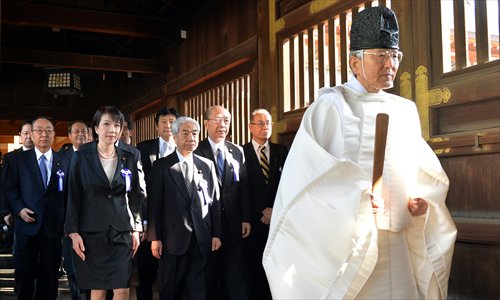Japanese boats driven away

Analysts warned that regional tensions could escalate and China-Japan ties will further deteriorate after Japanese nationalists entered the waters of the Diaoyu Islands and were driven out on Tuesday, their exit coming on the same day as a visit to the controversial Yasukuni Shrine by a large group of Japanese lawmakers.
China protested against Japan's intrusion into the waters surrounding the Diaoyu Islands after Chinese marine surveillance vessels drove several Japanese boats out of the area.
Chinese Ambassador to Japan Cheng Yonghua lodged the protest during his meeting with Japanese Vice Foreign Minister Chikao Kawai and rejected Japan's protest over Chinese surveillance ships entering the waters.
The Chinese fleets had forced the Japanese fishing boats out of the waters surrounding the islands as of 10 am, thwarting the attempts of "Japanese right wingers," the Chinese State Oceanic Administration said in a statement published on its website.
Some 10 fishing boats carrying more than 80 members of "Ganbare Nippon" (Stand Firm, Japan), a nationalist group, left Ishigaki Island in Okinawa and headed toward the islands Monday night, Japan's Kyodo news agency reported.
In Tokyo, Japanese Chief Cabinet Secretary Yoshihide Suga told reporters that Chinese marine surveillance ships' activities were "extremely regrettable and unacceptable."
"With the tension in the Korean Peninsula appearing to have eased momentarily, the row with China over the Diaoyu Islands is again a major diplomatic focus for Japan," Geng Xin, deputy director of the Tokyo-based Japan-China Communication Institute, told the Global Times.
"Tokyo hopes to gain more leverage when it is in dialogue with China in the future through the recent moves," Geng said. "But the relationship between the two countries could further deteriorate."
The relationship between China and Japan sharply deteriorated after Japan's "nationalization" of the islands last September.
China on Tuesday also censured Japan after a record 168 Japanese lawmakers visited the Yasukuni Shrine, where convicted class A WWII criminals were honored.
"No matter in what form and identity, the intent of the Japanese leaders' visits to the Yasukuni Shrine is to deny the history of Japanese militarist aggression," Chinese foreign ministry spokeswoman Hua Chunying told reporters.
"How Japan views history and deals with the shrine is an important benchmark for its Asian neighbors and the international community to observe and understand what role it will play in the future," she said.
The number of visiting lawmakers was the largest since 1989, Kyodo said. Japan's Deputy Prime Minister Taro Aso also visited the shrine on Sunday.
Though Shinzo Abe did not visit the shrine, he offered a sacrifice in the name of "prime minister" on Sunday.
The election of the upper house of Japanese Parliament in July is one reason why so many politicians made high-profile visits to the Yasukuni Shrine, analysts said.
"They all wanted to demonstrate their toughness to score political points," said Huang Dahui, an expert on Japanese studies at the Renmin University of China.
Another reason is that many conservative politicians were elected into the parliament in Japan's election in December, Huang said.
Masahiko Komura, president of the Japan-China friendship parliamentarians' union and vice president of the ruling Liberal Democratic Party, said on Monday he was canceling a May 1-3 visit to China after the Chinese side said it was having difficulty scheduling his meeting with Chinese leaders, the Asahi Shimbun reported.
"China didn't want to shut the door of engagement and dialogue, but as Japan showed no sincere wish for such a possibility, it was not time for the two sides to have talks," Huang told the Global Times.
Agencies contributed to this story